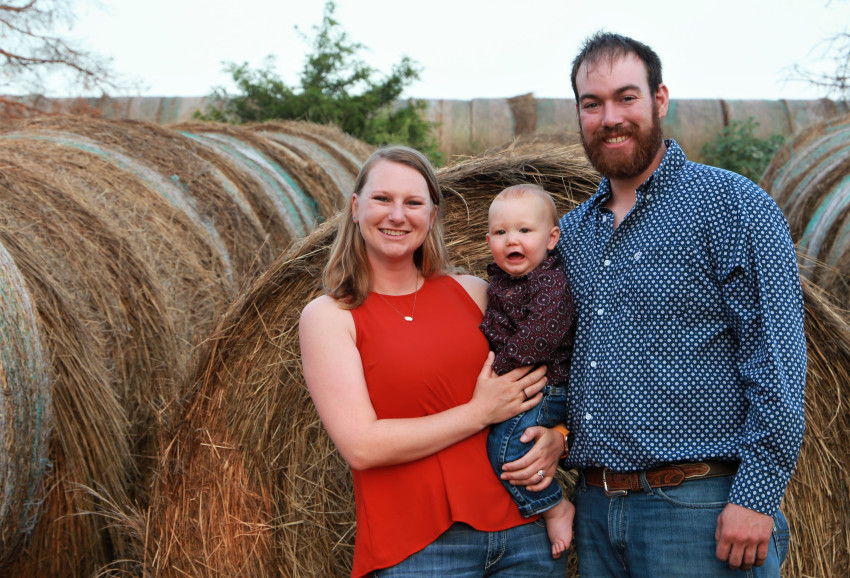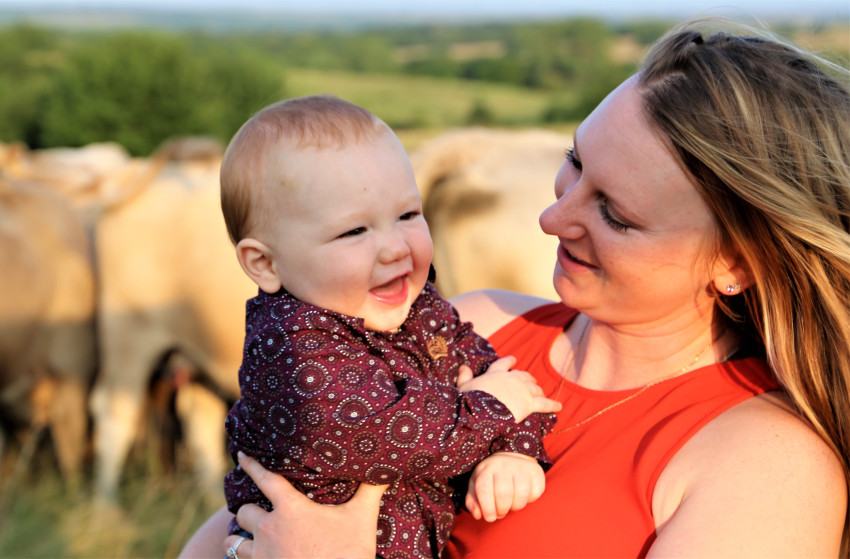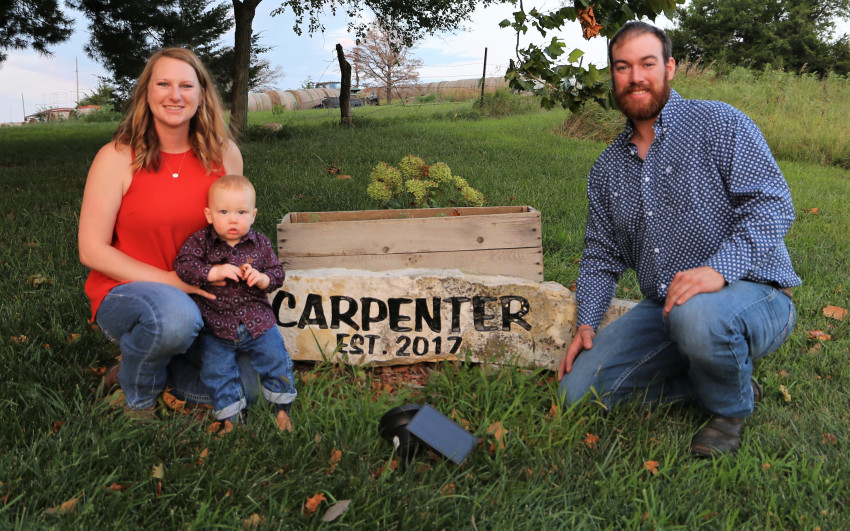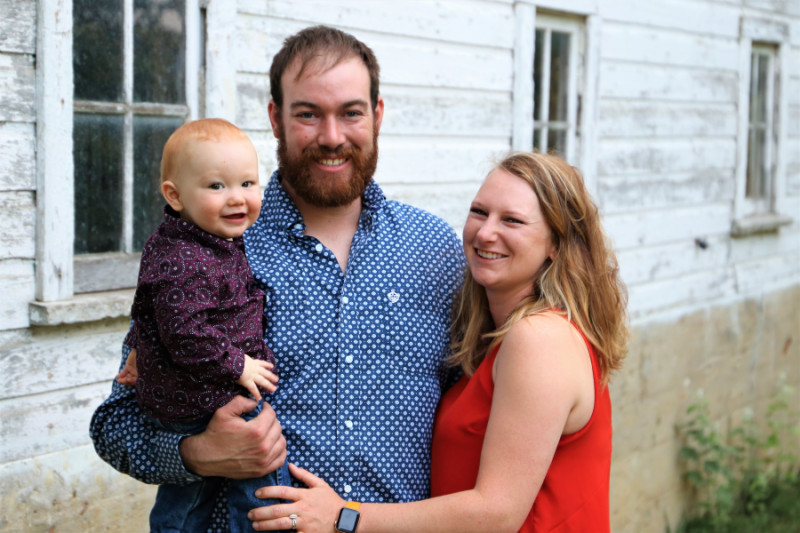By Kansas Living on November 2, 2022
Get to know the Carpenter Ranch Family
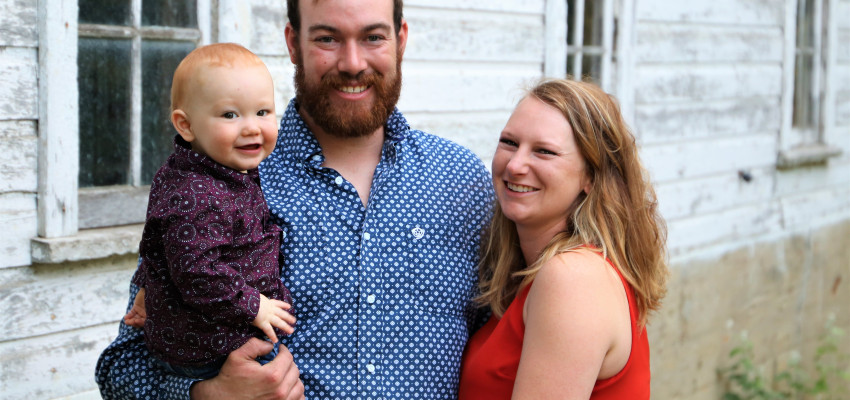
We caught up with Kenley Carpenter, a busy ranch wife and mom, and asked her to share about her family and farm operation. Here's what she shared!
My husband, Bryce, and I run a cow/calf operation consisting of Angus/Charolais crossbreds in Jackson County, all while chasing around our 2-year-old son, Calvin.
We have around 160 cows, half of which are spring cows and half fall cows (meaning that’s when they’ll have their babies). We also have a custom calving business, where we feed the cattle, check the heifers and cows throughout the day, provide calving assistance and ensure the health of the calves until they leave the farm. We also have 1,100 acres of native grasses, fescue, prairie and brome to maintain.
1) What three things matter most to you as a rancher?
I think the three most important things about being a rancher are family, faith and transparency.
Family is what got me here. My dad taught me everything I know and stirred this passion within me. My husband is a very patient man who understands I don’t have a typical Monday-through-Friday job.
Faith can be construed in different ways — not just a spiritual faith (though I think that’s important) but also faith in yourself and in your system. You have to believe what you’re doing is important and that you can accomplish anything you set your mind to.
I feel we also must be completely transparent about what we do. There are some ugly parts of ranching we don’t necessarily want the world to see, but how can we expect consumers to trust us if we don’t show them all aspects of what we do?
2) What is the spring calving season like?
“Organized chaos” is the best way I can describe spring calving season, which can last from January to May. On average, we’ll have 100 heifers (pregnant with their first calf) and 300 cows to monitor for when they have their babies, or “calve out.” We pride ourselves in our care of the heifers and check them every three to four hours, even overnight. My dad and I split those checks: He goes at midnight, I go at 3 a.m., and he goes again at 6 a.m. That way, he sleeps from 12 to 6 a.m. and I sleep until 3 a.m. It’s a great system for us!
3) What does sustainability mean to you?
To me, sustainability means I have something to pass down to my kids and future grandkids. When you look at the big picture, sustainability means managing the land we have so it continues to produce a quality product. I need to make sure I pass along my passion and drive to future generations and show them hard work pays off. Sustainability comes down to leaving a legacy and constantly growing and moving forward — not being so stuck in our ways that we avoid change.
4) Where do you see the future of your operation going?
Honestly, my vision of our future operation doesn’t look much different than it does today. I want to maintain what we have and continue to be passionate about what I do, and I never want that spark to go out. Technology or methods will be developed in the future that could vastly change the way we do things. Ideally, I hope to have something to pass on to my kids and their kids.
5) What is one thing you wish consumers knew about your operation?
I wish consumers knew how much heart we put into our product and how much we care for our animals. We love our cows and know they can’t give us their best if we don’t give them ours. We spend our days — all 365 of them — putting our animals’ needs above our own. Regardless of the weather, we’re out there making sure our animals have good food, water and shelter.
6) What is the hardest and best part of your job as a rancher?
I would say the hardest part of the job is that I have to be realistic and pragmatic when it comes to the way of life. We all know not every calf that comes into this world is going to make it to grass and it’s such a hard pill to swallow. That has become a lot harder since becoming a mom. In the same sense, saving a calf is the best part of the job in my opinion. When I assist that heifer in labor and get a live calf, I get so excited. Knowing that without me, that calf and possibly that cow wouldn’t have made it makes it all worth it in the end.
7) What’s your favorite way to prepare beef?
My absolute favorite way to prepare beef is a good home-raised steak on the grill with a fresh salad and some seasonal veggies. However, I know we can’t eat steak every night for dinner so I always have other recipes up my sleeve. Like most producers, we eat beef we have raised ourselves,. so we have an abundance of ground beef in the deep freeze at our disposal. I love to make barbecue meatballs as an easy weeknight meal. I normally thaw out a couple of pounds of hamburger at a time so I can make a big batch and throw some in the freezer so I have them available for those nights when I’m running behind. Throw them in the crockpot with some homemade barbecue sauce (or store-bought if I’m in a pinch) and I’ve got an easy meal that’s ready to eat when I walk in the door.
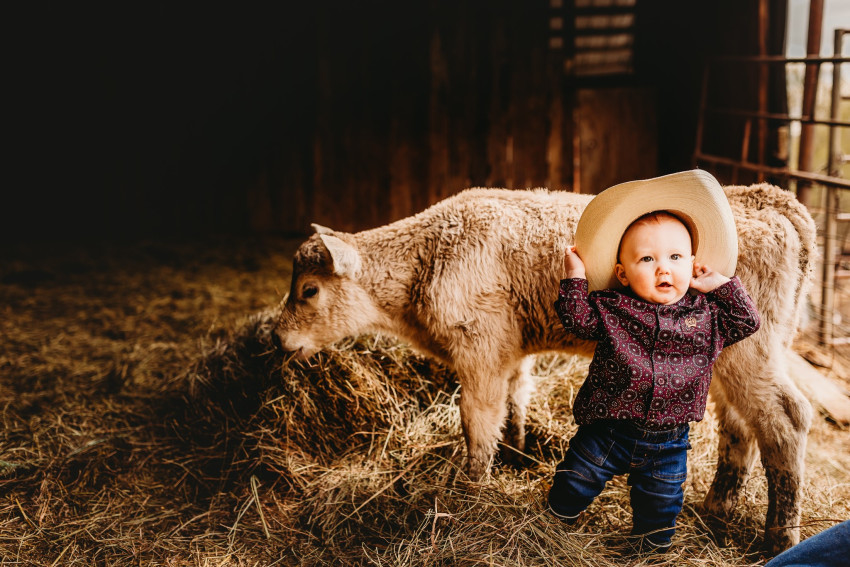
Jess Stitt Photography
8) What's a typical day/week/month look like for you?
I think as a farmer/rancher there is no such thing as a typical day! We constantly have to be flexible and willing to change our plans based on the weather or the needs of the operation. Sometimes we have plans to haul hay, but the cows decide to get out. Then we change directions and go fix fence. I think that’s the beauty of our jobs on the ranch - they are never predictable. Sure, we can predict the seasonal jobs that will come around: chores in the winter, calving in the spring and fall, hay in the summer. A typical day normally involves a strong cup of coffee in the morning, getting the toddler up and ready for the day and heading to my dad’s house to get started. I live just two miles away from my parents so it’s an easy drive. Since having our son my days look a little different because I need to take care of his needs. Bryce works off the farm and works evenings so I’m normally done for the day at a decent time so I can get Calvin home and fed and off to bed at a reasonable time.
9) What’s one thing you've changed on your operation since you started?
You’re going to laugh but the one thing that I feel has helped so much on our operation is the use of cell phones between my dad and me. Since coming home from college my dad got a smartphone and we’ve slowly been teaching him. Texting has made a huge difference in our communication because it is so easy and convenient and leaves a wonderful “paper trail.” We constantly text each other when someone has a calf with details and sometimes a picture. We can write down tag numbers of calves that are sick, head counts for different pastures, what cows are in heat, etc. Then when we get back to the house we can look back through our messages and transfer that to our record books.
10) What would you do if you weren’t a rancher?
This is a tough one, I don’t know what we’d do besides ranching! I would most likely be doing something outside, I absolutely love being outdoors every day and go a little stir-crazy when we get rain and I’m in the house. I love working with my hands and seeing the fruits of my labor at the end of the day so manual labor would probably be a given and most likely in the agriculture field.

